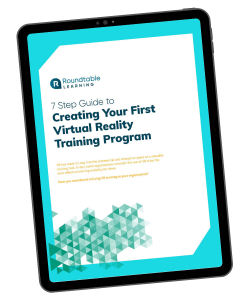Both soft skills and hard skills are critical to developing high-performing employees that lead an organization to success.
- Soft Skills — The intangible elements or personal attributes that characterize our interactions with other people. Examples of these skills include communication, empathy, and work ethic.
- Hard Skills — The job-specific abilities that concern an employee’s competency to complete certain tasks in their role. Examples of these skills include repairing equipment, programming, and accounting.
These skills can be taught through both traditional training techniques (e.g. role-playing, one-on-one coaching, and apprenticeships) and more modern strategies that involve technology (e.g. eLearning, augmented reality (AR), and virtual reality (VR)).
Developing the soft and hard skills of your employees is critical to improving work productivity, employee retention, attendance, and so much more. You may be wondering — what exactly are these skills and how are they developed?
At Roundtable Learning, we’ve worked with clients across the globe to build training solutions that develop their learners’ skills and increase their bottom line. We see the value that hard and soft skills training brings to growing your employees and creating a more efficient, effective, and engaged workforce.
This article will define what soft skills and hard skills are, point out key differences between these skills, and provide examples of how these skills are typically developed.
What Are Soft Skills?
Soft skills are the intangible elements or personal attributes that characterize our interactions with other people. Also known as “human skills” or “social skills,” soft skills stem from our emotional intelligence and individual character.
Examples of soft skills include:
- Communication
- Empathy
- Work Ethic
- Adaptability
Every employee uses soft skills. Whether you work in customer service, manufacturing, or healthcare, it’s likely you collaborate with a team, must manage your time wisely, be empathetic for others, and so on. The value of soft skills flows both ways, as employees and their organization increase their value by developing these skills.
Although they’re more difficult to measure than hard skills, soft skills training is important because it provides employees with a basis for building relationships, solving problems, managing time, and ultimately driving productivity at their organization.
Free Whitepaper Download: Soft Skills Training
How Are Soft Skills Learned?
Soft skills training has traditionally been deployed through instructor-led training (ILT) where learners complete various activities in-person with others. In this environment, employees develop soft skills by having the time and space to practice.
This practice comes in many forms:
- Role-Playing – Interactive activities during ILT sessions give learners the opportunity to work through examples where they use their soft skills in a safe environment.
- eLearning – Learners are taught key concepts and best practices through custom eLearning modules and interactive assessments.
- Feedback and Coaching – Organizational leaders provide feedback to employees based on their observable behaviors. This feedback highlights opportunities where the employee can improve their behaviors and develop into a more productive employee.
- 360º Virtual Reality (VR) – In-person role-playing activities are recreated with 360º VR activities, allowing learners to practice on their own, receive feedback, and continue practicing until they master the concept.
A fully comprehensive soft skills training program that integrates both traditional and emerging training methods will effectively develop soft skills in your learners. Consider pairing multiple learning methods to create a blended learning program.
Read More: The Future of VR for Soft Skills
What Are Hard Skills?
Hard skills, also known as “technical skills”, are job-specific abilities that are necessary for employees to fulfill their day-to-day responsibilities.
Examples of hard skills include:
- Operating and repairing equipment
- Developing and programming
- Statistical analysis
- Accounting
Hard skills vary based on an employee’s specific role and the industry they work in. For example, a retail employee will utilize more customer-focused hard skills (e.g. mastering the use of a point-of-sale system or learning how to organize merchandise) than an employee who works in manufacturing with complex technical tasks (e.g. equipment maintenance or working on a production line).
Hard skills training is critical to the success of your employees and organization because it addresses the skills your workforce needs to perform their daily tasks accurately, safely, and efficiently, leading to better employee performance and productivity.
How Are Hard Skills Learned?
Hard skills are typically taught through on-the-job training where learners can interact with real-life equipment. Hard skills focus on the completion of specific processes and the operation of equipment, so it’s common to learn these skills by completing hands-on training.
This training comes in many forms:
- eLearning – Introduce terminology, explain processes, and identify key concepts to learners through self-paced modules.
- Video Learning – Whether it’s a how-to video for fixing equipment or recreating a safety incident, you can show your employees what to look out for and provide key information for reacting appropriately.
- Apprenticeships and Job Shadowing – Pair your trainee with a trusted employee out on the job so they can see first-hand how to perform job functions from someone with experience.
- Full VR – Give your learners the ability to actually practice physical tasks and movements by recreating job functions in a fully simulated environment. This allows for experiential learning from a safe environment and effectively builds up muscle memory.
- Augmented Reality (AR) – Recreate digital versions of complex equipment and machinery. With these digital models, learners can explore each object holistically or break down every piece and part without having to take real-world equipment out of commission.
Just as soft skills training can be elevated by future learning technologies, so can hard skills training.
Read More: Why You Should Consider A Blended Learning Program
Soft Skills vs. Hard Skills: Key Differences
One major difference between hard skills and soft skills is how they’re used in the workplace. Hard skills support an employee’s ability to do a specific task, while soft skills are more about how the employee interacts with others while doing their job.
Another major difference between hard skills and soft skills is how they’re acquired. Given the more technical nature of hard skills, they’re learned through more formal, hands-on practice and repetition. Soft skills, on the other hand, can be learned through personal less formal experiences that involve listening, observing, and speaking with others and role-playing.
There’s a common misconception that hard skills are more important than soft skills. This isn’t exactly the case. In fact, 92% of executives say soft skills are equally as important, if not more important, than hard skills.
These skills may have their differences, but ultimately both contribute to the success of an employee at their workplace.
Ensure Your Employees Have The Soft And Hard Skills They Need To Succeed
In this article, we’ve covered what soft skills and hard skills are, along with the importance of developing these skills and the value they can bring to your workforce.
Whether you want to build your own custom training program or are looking to elevate your existing program, we’ve got you covered. Schedule a meeting with one of our experts or feel free to check out more of our resources today!








